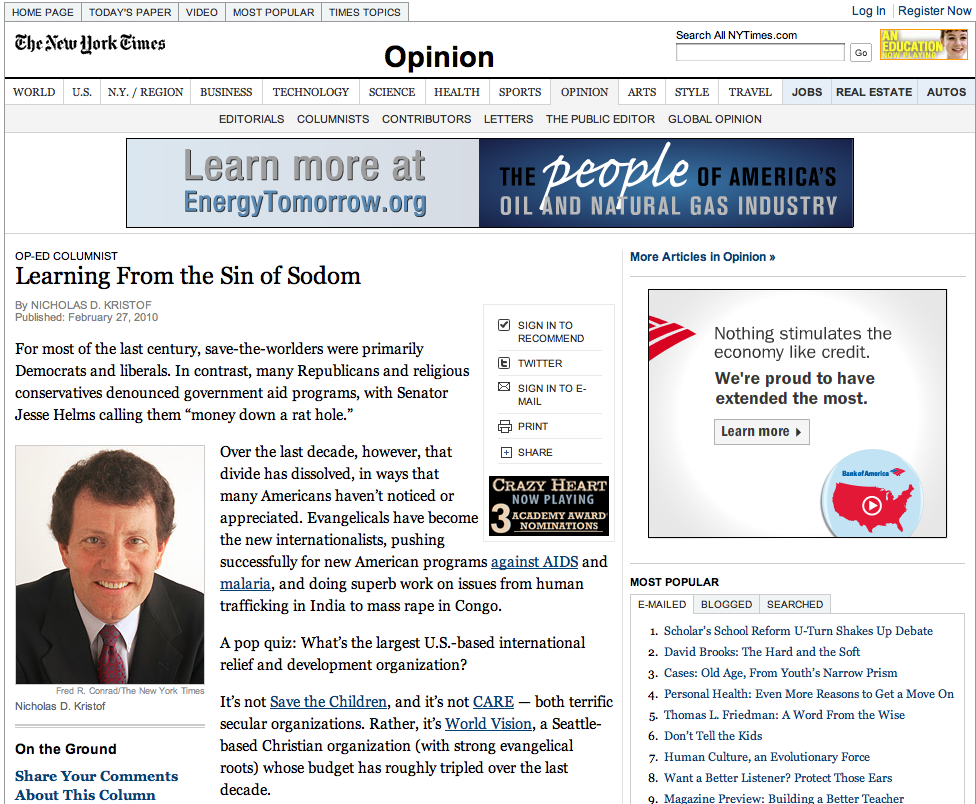Learning From the Sin of Sodom
There is a great article in today's New York Times by Nicholas Kristof, who has written about what a huge mistake it would be not to channel government money through faith-based organizations for international aid. Read below or at http://www.nytimes.com/2010/02/28/opinion/28kristof.html.
Blessings, Pastor Joel
OP-ED COLUMNIST
Learning From the Sin of Sodom
By NICHOLAS D. KRISTOF
For most of the last century, save-the-worlders were primarily Democrats and liberals. In contrast, many Republicans and religious conservatives denounced government aid programs, with Senator Jesse Helms calling them “money down a rat hole.”
Over the last decade, however, that divide has dissolved, in ways that many Americans haven’t noticed or appreciated. Evangelicals have become the new internationalists, pushing successfully for new American programs against AIDS and malaria, and doing superb work on issues from human trafficking in India to mass rape in Congo.
A pop quiz: What’s the largest U.S.-based international relief and development organization?
It’s not Save the Children, and it’s not CARE — both terrific secular organizations. Rather, it’s World Vision, a Seattle-based Christian organization (with strong evangelical roots) whose budget has roughly tripled over the last decade.
World Vision now has 40,000 staff members in nearly 100 countries. That’s more staff members than CARE, Save the Children and the worldwide operations of the United States Agency for International Development — combined.
A growing number of conservative Christians are explicitly and self-critically acknowledging that to be “pro-life” must mean more than opposing abortion. The head of World Vision in the United States, Richard Stearns, begins his fascinating book, “The Hole in Our Gospel,” with an account of a visit a decade ago to Uganda, where he met a 13-year-old AIDS orphan who was raising his younger brothers by himself.
“What sickened me most was this question: where was the Church?” he writes. “Where were the followers of Jesus Christ in the midst of perhaps the greatest humanitarian crisis of our time? Surely the Church should have been caring for these ‘orphans and widows in their distress.’ (James 1:27). Shouldn’t the pulpits across America have flamed with exhortations to rush to the front lines of compassion?
“How have we missed it so tragically, when even rock stars and Hollywood actors seem to understand?”
Mr. Stearns argues that evangelicals were often so focused on sexual morality and a personal relationship with God that they ignored the needy. He writes laceratingly about “a Church that had the wealth to build great sanctuaries but lacked the will to build schools, hospitals, and clinics.”
In one striking passage, Mr. Stearns quotes the prophet Ezekiel as saying that the great sin of the people of Sodom wasn’t so much that they were promiscuous or gay as that they were “arrogant, overfed and unconcerned; they did not help the poor and needy.” (Ezekiel 16:49.)
Hmm. Imagine if sodomy laws could be used to punish the stingy, unconcerned rich!
The American view of evangelicals is still shaped by preening television blowhards and hypocrites who seem obsessed with gays and fetuses. One study cited in the book found that even among churchgoers ages 16 to 29, the descriptions most associated with Christianity were “antihomosexual,” “judgmental,” “too involved in politics,” and “hypocritical.”
Some conservative Christians reinforced the worst view of themselves by inspiring Ugandan homophobes who backed a bill that would punish gays with life imprisonment or execution. Ditto for the Vatican, whose hostility to condoms contributes to the AIDS epidemic. But there’s more to the picture: I’ve also seen many Catholic nuns and priests heroically caring for AIDS patients — even quietly handing out condoms.
One of the most inspiring figures I’ve met while covering Congo’s brutal civil war is a determined Polish nun in the terrifying hinterland, feeding orphans, standing up to drunken soldiers and comforting survivors — all in a war zone. I came back and decided: I want to grow up and become a Polish nun.
Some Americans assume that religious groups offer aid to entice converts. That’s incorrect. Today, groups like World Vision ban the use of aid to lure anyone into a religious conversation.
Some liberals are pushing to end the longtime practice (it’s a myth that this started with President George W. Bush) of channeling American aid through faith-based organizations. That change would be a catastrophe. In Haiti, more than half of food distributions go through religious groups like World Vision that have indispensable networks on the ground. We mustn’t make Haitians the casualties in our cultural wars.
A root problem is a liberal snobbishness toward faith-based organizations. Those doing the sneering typically give away far less money than evangelicals. They’re also less likely to spend vacations volunteering at, say, a school or a clinic in Rwanda.
If secular liberals can give up some of their snootiness, and if evangelicals can retire some of their sanctimony, then we all might succeed together in making greater progress against common enemies of humanity, like illiteracy, human trafficking and maternal mortality.




